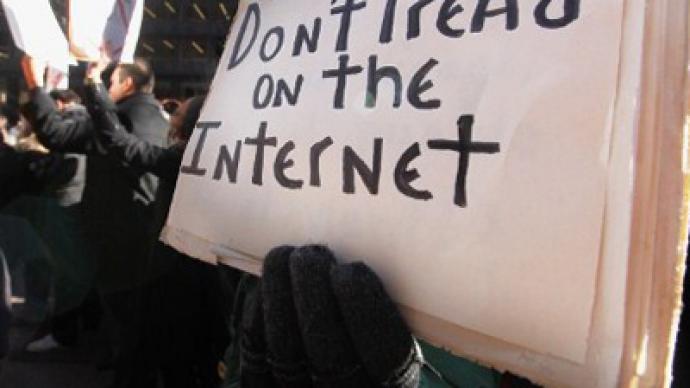Secret US-corporate negotiations creating SOPA on steroids?

Pro-SOPA industry giants urged the White House in secretive international trade talks to adopt stronger intellectual property protections. Critics say the negotiations could usher in “draconian” provisions capable of strangling Internet freedom.
Scores of SOPA supporters wrote President Obama this past Tuesday urging that “the United States redouble its efforts to ensure that the final TPP (Trans-Pacific Partnership) agreement is comprehensive and commercially meaningful and incorporates high standards for the protection and enforcement of IP rights across all industries.”The letter was signed by the US Chamber of Commerce, the Motion Picture Association of America (MPAA), the Recording Industry Association of America (RIAA) – all of whom have been accused of clamping down on Internet freedom.The United States is meeting with representatives of eight other countries in Dallas, Texas, this week for the 12th round of talks on the TPP agreement. Parties to the negotiations seek the further economic liberalization of economies in the Asia-Pacific region.Critics have called TPPS a NAFTA for the Asia-Pacific region. But really, its reach extends far beyond trade and investment.The non-profit digital rights advocacy organization Electronic Frontier Foundation (EFF) warns that the secret TPP meetings could “create over-reaching new rules and standards that will choke off the online speech of individuals, websites, and platforms accused of copyright infringement.”The letter to Obama attempted to counter these criticisms by saying the IP desired IP protections aren’t “a threat to the development and expansion of the Internet or rights of freedom of speech.” Rather, they are “a much-needed response” to sophisticated worldwide threats to IP protection.However, the popular tech blog techdirt notes that “these groups don't even hide the fact that they know what IP protections are being proposed by the US government in the TPP negotiations… because they're heavily involved in the process.”The Stop Online Piracy Act (SOPA) also sought to squash online trafficking in intellectual property and pirated goods. But as a bill that was introduced in the US House, its content was open to public oversight and debate.In contrast, the general public has been forbidden from viewing TPP provisions. However, a leaked version of a February 2011 TPP draft showed that the US is pushing for copyright measures which the EFF says are far more restrictive than even the controversial Anti-Counterfeiting Trade Agreement (ACTA).The draft proposed “treating temporary reproductions of copyrighted works without copyright holders’ authorization as copyright infringement.” It would also criminalize fair use by introducing “criminal sanctions for copyright infringement that is done without a commercial motivation.” Legal incentives would also force Internet service providers to work with copyright holders in halting the unauthorized storage and transmission of copyrighted materials.All signatories will be forced to modify their domestic laws to match the agreement’s provisions, completely circumventing the legislative process by cutting the countries' lawmakers out of the equation.The United States Trade Representative (USTR) further canceled a full-day stakeholder presentation at the Dallas negotiations, increasing criticisms that the process is not transparent.The USTR asked stakeholders to register their interest by “sponsoring a table” in the off chance that negotiators happened to stroll by, the EFF notes.The current rounds of negotiations are scheduled to run until May 18th. The United States hopes to finalize the agreement by July.














